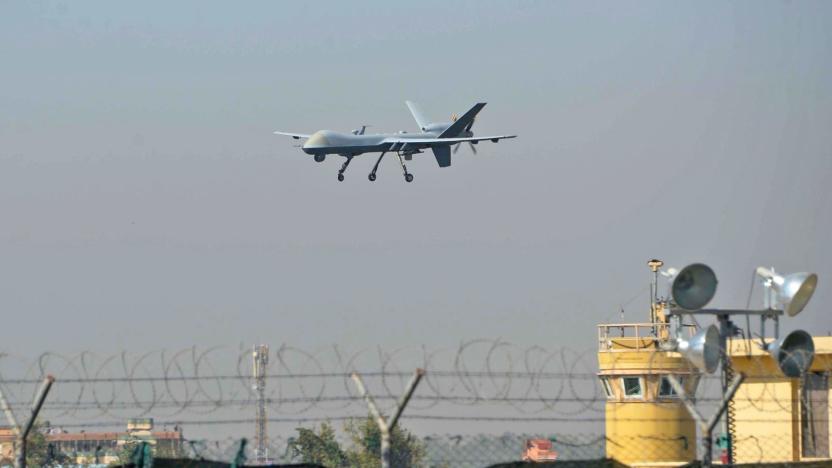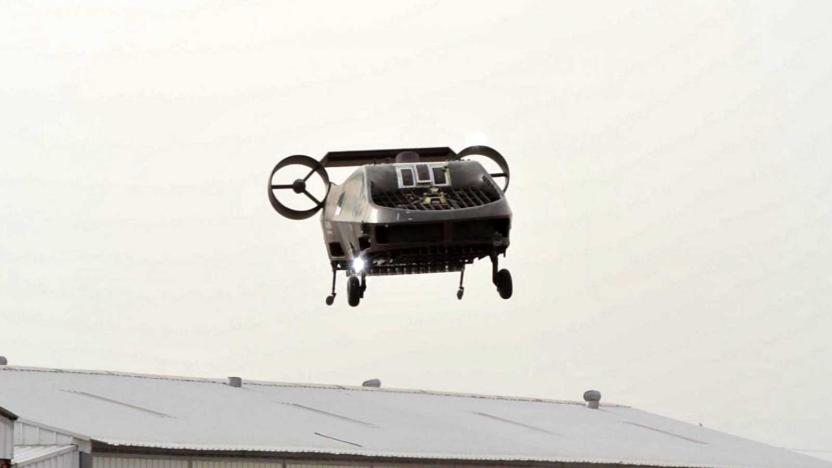military
Latest

DARPA wheels change from tires to tracks without stopping
Travel across difficult terrain usually involves a lot of compromise. Tracks will get you where you need to go, but they're slow whenever you're covering open ground. DARPA, however, doesn't think you should have to make that choice. It's working with Carnegie Mellon University on Reconfigurable Wheel-Track technology that converts wheels from tracks to tires (and vice versa) in the middle of a drive. As you can see in the clip below, the change takes just two seconds -- you could drive off the road and up a hillside without skipping a beat.

US Army asks startups to deliver next-generation weapons
While the US Army already works with huge military contractors, it still wants to make sure that it won't miss the chance nab new technologies developed by small businesses. That's why it has launched the Army Expeditionary Technology Search or xTechSearch, which will give "nontraditional defense partners" the chance to work with the military division. xTechSearch is a four-phase competition that promises a $200,000 cash prize for the final winner to be announced in April 2019. It's soliciting innovative technologies the army could use, such as next-gen combat vehicles that can replace tanks.

Google staff reportedly refused to work on government security tool
Bloomberg reports today that earlier this year, a group of Google employees refused to work on a security tool that would have opened up more military contracts to the company. The tool in question is air gap technology that would be key to the development of the secure cloud configurations required by government agencies. Without it, Google might be left in the "Moderate" security rating it has been granted by the Federal Risk and Authorization Management Program, while others like Microsoft and Amazon have products with "High" ratings that give them access to additional contracts.

Trump directs Pentagon to form a Space Force military branch
It looks like the US could have a sixth military branch sometime in the future, one focused entirely on space. President Trump said during a National Space Council meeting today that he has called for the development of a Space Force, CNBC reports. "I am hereby directing the Department of Defense and Pentagon to immediately begin the process necessary to establish a Space Force as the sixth branch of the armed forces," he said. "Our destiny beyond the Earth is not only a matter of national identity but a matter of national security."

Google reportedly won’t renew its controversial military AI contract
The controversial government contract that led thousands of Google employees to sign a petition in opposition and dozens to quit in protest will not be renewed, Gizmodo reports. Project Maven has been billed by Google as a small, "non-offensive" deal through which it would provide open-source AI software to the Pentagon that could help the military flag drone images requiring further human review. But the project has been decried by many of the company's employees who believe it could hurt efforts to hold the public's trust and went against Google's "Don't Be Evil" motto.

Google's military AI drone program may be more lucrative than it said
Google's Project Maven program for AI-based military drone image recognition program could net the company up to $250 million per year, according to internal memos seen by The Intercept. That's a lot more than the $9 million Google reportedly told employees the contract was worth. What's more, the program may be tied to a much bigger contract, possibly the US military's JEDI Cloud program.

Google says its military AI work will be guided by ethical principles
Google's Pentagon contract and its involvement with the military's Project Maven has stirred controversy both outside of and within the company. Its plan to provide AI technology that can help flag drone images for human review has led to an internal petition signed by thousands of employees who oppose the decision as well as a number of resignations. Now, the New York Times reports that Google is working on a set of guidelines aimed at steering the company's decisions regarding defense and intelligence contracts.

Watch a medevac drone perform a simulated rescue
Medevac missions won't have to put more humans in danger if Tactical Robotics has its way. The Urban Aeronautics-owned firm has successfully completed its first "mission representative" demo of the Cormorant, an autonomous VTOL (vertical takeoff and landing) drone that can pick up two casualties without requiring a crew. The only people directly involved are those loading the victims -- there's a video camera for talking to conscious patients, but the machine otherwise flies on its own.

Autonomous helicopter makes first operational delivery to Marines
Drones are coming to the battlefield faster than you think. Aurora Flight Sciences recently unveiled an autonomous, LiDAR equipped helicopter called AACUS, which was already an impressive feat, considering a helicopter's complexity. Now, for the first time, it has completed an autonomous, closed-loop cargo mission, delivering gas, water and medical supplies to US Marines during an integrated training exercise in California.

US elevates the role of Cyber Command
After months of talk and planning, US Cyber Command is now just as important as the rest of the Pentagon's commands -- at least, on paper. The military has officially elevated its cyberwarfare division to a "unified command" that operates independently of the NSA. It's not a complete split. General Paul Nakasone (shown above) will run both Cyber Command and the NSA, replacing Admiral Michael Rogers.

Pentagon bans Huawei, ZTE phones from military base retailers
The Pentagon has banned retailers on US military bases from selling Huawei and ZTE phones, the Wall Street Journal reported. Officials are concerned that the Chinese government could order the firms to track soldiers' movements or snoop on their communications, though Huawei and ZTE have both denied that could be the case.

US military hopes to launch rockets in 'days, not years'
Even in the era of private spaceflight companies, the process of getting a rocket into space is glacially slow: it can take months or years to schedule and prepare for a mission. That was fine when launching any rocket was a special occasion, but DARPA thinks the industry can do better. The military research agency recently kicked off a Launch Challenge that encourages companies to cut these launch timetables to "days, not years." Teams will have to develop systems that can launch two low Earth orbit rockets at different sites within days of each other, and with little advance notice. They'll only know where the first launch site will be within a "few weeks," and they'll learn about the payload mere days before blastoff.

Google is helping US military train AI to study drone footage
The US military's Project Maven is getting some help using AI to interpret drone footage from a not-entirely-unexpected source: Google. The company has confirmed a Gizmodo report that it's offering TensorFlow programming kits to the Defense Department as part of a pilot that helps Project Maven process the glut of drone footage quickly. Google stresses that the machine learning technology is involved in "non-offensive uses only," and that it's flagging material for "human review." This isn't helping with drone strikes, then, but it has still raised concerns inside Google's ranks.

Medics may slow biological time to save soldiers' lives
Battlefield medics frequently only have a brief window of opportunity to treat an injury before it's fatal or causes permanent disabilities, and it's frequently so fleeting that there's not much they can do. DARPA is exploring an unusual solution to that problem: slow the biological processes to give medics more room to breathe. Its new Biostasis research program aims to bring cell activity to a near halt by using biochemicals that control energetics at the protein level. If animals like tardigrades and wood frogs can stabilize their cells to survive freezing and dehydration, similar techniques might offer more time to medics who want to treat wounds before a victim's vital systems break down.

Air Force security hackathon leads to record payout
The US Air Force's second security hackathon has paid dividends... both for the military and the people finding holes in its defenses. HackerOne has revealed the results of the Hack the Air Force 2.0 challenge from the end of 2017, and it led to volunteers discovering 106 vulnerabilities across roughly 300 of the USAF's public websites. Those discoveries proved costly, however. The Air Force paid out a total of $103,883, including $12,500 for one bug -- the most money any federal bounty program has paid to date.

US military explores using sea life to spot threats
The sea is potentially full of undersea military threats, and that makes it daunting to detect them all using hardware. The scale and cost would be utterly impractical. DARPA, however, has a potential workaround: make sea life do the work. It recently launched a Persistent Aquatic Living Sensors program (yes, that shortens to PALS) that will study the viability of using both natural and modified sea organisms to detect underwater vehicles. If the US military can translate the biological responses of this sea life into usable data, it could warn ships without needing conspicuous, expensive hardware -- the fish and plants would be enough.

Strava will focus on privacy awareness to address security issues
The CEO of fitness tracking app Strava has responded to security concerns raised this week regarding the publicly-available details of secret military bases. In a blog post, James Quarles addressed the sensitive nature of information readily available on the app's heatmap feature and said the team is "taking the matter seriously". Strava is "committed to working with military and government officials" to address the issue, he said, adding that the team is reviewing features that were originally designed for "athlete motivation and inspiration" to make sure they can't be used nefariously.

Pentagon reviews policy after fitness app reveals military locations
Yesterday, reports surfaced that a heat map released by fitness app company Strava showed the locations of US and other countries' military. While most of the locations spotted, including Afghanistan and Syria, are known to host US military bases, it still highlights the fact that information the Department of Defense would prefer remain under wraps could find its way out into the open. It also demonstrates that fitness apps could pose a security threat if location information isn't correctly handled. Now, Reuters reports, US Defense Secretary Jim Mattis has ordered a review of the situation.

Strava fitness tracking data reveals details of secret bases
Location data in fitness apps is frequently a good thing, since it helps you remember and optimize your routes. However, it's also producing an unexpected security risk: it's revealing details of secret military bases. UCA analyst Nathan Ruser has discovered that Strava's publicly available activity map includes the fitness routes of soldiers and agents in sensitive locations, including American bases in Afghanistan and Syria, the UK's Mount Pleasant airbase in the Falkland Islands, a suspected CIA base in Somalia and even Area 51. It's mostly American and British troops who show up, but Russian bases have also been outlined by the Strava data.

Researchers create tiny robots powered only by moisture
Tiny robots that can move on their own stand to have a variety of uses in fields ranging from medicine to the military. But having to supply them with constant power is a bit of a hindrance, especially when that power poses a safety hazard -- you can't really have robots running around a human body if their batteries are at risk of exploding. However, in a new study, researchers turn to plants in order to get around this problem and the result is a tiny, inchworm-like robot that runs on humidity.





